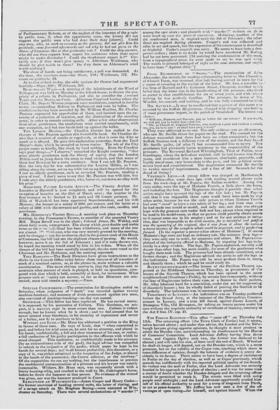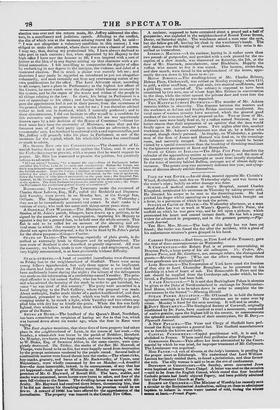THE FORFAR ELECTION.—This affair " came off " on Thursday
the 13th. The returning officer (the Town Clerk of Forfar) lied, it seems, taken learned advice ; and under that advice, the London and the Edin-
burgh lawyers giving opposite opinions, he thought it most prudent to admit the Dundee vote, notwithstanding its disallowance by the House of Commons' Committee. Lord Advocate Jeffrey having thus three votes, and Captain Ogilvy only two, the former was declared to be elected • and will take his seat, at least until the end of March. Whether
he shalt sit longer, will depend, not on the Dundee vote, which is a mere pretence, but on the validity of the Cupar vote, touching which there is some difference of opinion, though the balance of evidence is pretty de- cidedly in its favour. There seems to have been a degree of excitement in Forfar on the day of election, as well as at Cupar previously, which accords but indifferently with the reported political apathy of the Scotch. So violent was the mob at Forfar, that the Lord Advocate was severely hustled in his approach to the place of election ; audit wag for some time a matter of doubt whether the Dundee delegate and the returning officer would be permitted to reach it. The streets were filled with noisy people until midnight"; and the Lord Advocate opportunely availed him- self of his official authority to send for a troop of dragoons from Perth, to act as peace-keepers: ' Mr. Jeffrey has now seen a few of the ad- vantages of open voting—for himself, and against himself. When the election was over and the return made, Mr. Jeffrey addressed the elec- tors, in a conciliatory and judicious speech. Alluding to the conflict, the din of which was at the moment echoing round the hall, he said- " I was not altogether a voluntary candidate in this contest; I was obliged to make the attempt, where there was even a chance of success. I may say, that, during my professional life, I have always declined to take part in such contests ; but, when appointed by his Majesty to the high office I have now the honour to fill, I was inspired with a sort of horror at the idea of in any degree mixing up that character with a po- litical contention. I felt unwilling to comproniiie the dignity of office by embarking in any degree in the intrigue, the violence, and cabal of a contested election. But in truth a choice was scarcely left me ; and therefore I may justly be regarded as introduced to you not altogether voluntarily, and most certainly not from any overweening notion of my own qualifications for the office. The Lord Advocate must, according to all usages, have a place in Parliament ; as the highest law officer of the Crown, he must watch over the changes which become necessary in the system, and be the organ of the wants and wishes of the people in all things relating to the law. In short, his being in Parliament is a sort of appendage to his office ; and having been appointed, those who gave the appointment had it not in their power, from the recentness of the general election, to procure a seat for me ; I was therefore advised rather to look out in Scotland, which I naturally preferred ; and in these circumstances, I did not hesitate to offer myself as a candidate for this extensive and populous district, which for me was opportunely thrown open by a late decision of the House of Commons."—Great in- deed must have been the extremity of Ministers, when they put the foremost man of all their party upon so irksome an adventure, for a two-months' seat. Let Scotland be endowed with a real representation, and Mr...Jeffrey will properly take his place in Parliament as one of the members for the capital, which his whole life's labour has contributed so much to adorn.
ME. SPICING Rica AND Nit CONSTITITENTS.—The shoemakers of Li- merick having drawn up a petition against the Union, sent it over to the Under-Secretary to present, with a request that he would support its prayer. Mr. Rice has consented to present the petition, but positively refuses to advocate it.
" If I am asked," hesays, "to compare the proceedings of Parliament before and after the Union, I can do so easily and conclusively. Before the Union, our trade was fettered—our agriculture was depressed—and we were excluded from the British market. Since the Union, a freedom of intercourse has opened to our industry the whole of England. The Irish Parliament, by the vote of agistment, threw the burden of tithe-ahnost exclusively on the poor man ; the Imperial Par- liament, by the Composition Act, has removed many of the abuses and inequalities of the system. The Irish Parliament passed the detestable penal code ; the lave- rial Parliament has established perfect liberty of conscience."
BASINGSTOKE Yeemasate.—The Yeomanry under the command of Charles Shaw Lefevre, Esq., M.P., called the Hechfield and Dogmers- field Cavalry, were sworn in on Monday last, at the George Inn, Odiham. The Basingstoke troop was sworn in on Wednesday ; they are to be immediately accoutred and armed. In their ranks is a veteran of sixty, who took the same oath thirty-seven years since. A GENERAL FAST Waxeme.—The Ministers, Elders, and General Session of St. John's parish, Glasgow, have drawn up a petition, to be signed by the members of the congregation, imploring his Majesty to appoint a day for a general fast, to be held over the whole country. This fast is said to be called for on account of the alarming and cri- tical state in which the country is at present placed. If his Majesty should not agree to this proposal, a day is to be fixed by St. John's parish for the above purpose.—Glasgow Courier.
STATE or Teams—The .weaving, especially of plain goods, is de- scribed as extremely brisk iu Glasgow and its neighbourhood. The iron trade of Scotland is also described as greatly improved. All over the country, we believe, trade is now vigorous ; and employment, if not very highly remunerated, is at least procurable without difficulty.



























 Previous page
Previous page